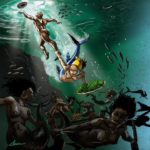Let’s talk about an Ariel who walks away—limping, mouthing inaudible sailors’ curses, a sea-brine knife in her belt.
Ariel traded her voice for a chance to walk on land. That was the deal: every time she steps, it will feel like being stabbed by knives. She must win the hand of her one true love, or she will die at his wedding day, turn to sea foam, forgotten. The helpful steward tells her to dance for the prince, even though her feet scream each time she steps. Love is pain, the sea witch promised. Devotion calls for blood.
But how about this? When the prince marries another, nothing happens. When Ariel stands over the prince and his fiance the night before their wedding, her sisters’ hard-won knife in hand, she doesn’t decide his happiness is more important than her life. She decides that his happiness is irrelevant. Her curse does not turn on the whims of this boy’s heart.
She does not throw away the knife and throw herself into the sea. She does not bury it in the prince and break her curse—it would not have broken. She leaves them sleeping in what will be their marriage bed and limps into a quiet night, her knife clean in her belt, her heart caught in her throat. Her feet scream, but they ache, too, for the places she has yet to see.
Ariel will not be sea foam or a queen. There is life beyond love. There is love in just living. Her true love will not be married on the morn—the prince will be married then, in glorious splendor, but he had never been why she was here.
Ariel traded her voice for legs to stand on, a chance at another life. When she poked her head above the waves, it wasn’t the handsome biped that she fell for. It was the way the hills rolled, golden in the sun. It was the clouds chasing each other across blue sky, like sea foam you could never reach.
(She does reach it, one day, bouncing around in the back of a tinker’s cart, signing jokes to him in between helping to tune his guitar. They crest up a high mountain pass and into the belly of a cloud. Her breath whistles out, swirls water droplets, and she reaches out a hand to touch the sky. Her feet will scream all her life, but after that morning they ache just a little bit less).
I want an Ariel who is in love with a world, not a prince. I don’t want her to be a moral for little girls about what love is supposed to hurt like, about how it is supposed to kill you. Ariel will be one more wandering soul, forgotten. Her voice will live in everything she does. She uses her sisters’ knife to turn a reed into a pipe. She cannot speak, but she still has lungs.
Love is pain, says the old man, when Ariel smiles too wide at sunrises. It’s pain, says the innkeeper, with pity, as Ariel hobbles to a seat, pipe in hand. At least you are beautiful, soothes the country healer who looks over her undamaged feet. The helpful steward had thought she was shy. Dance for the prince even though your feet feel stuck with a hundred knives.
Her feet feel like knives but she goes out dancing in the grass at midnight anyway. She’s never seen stars before. Moonlight reaches down through the depths, but starlight fractures on the surface. Ariel dances for herself.
She goes down to caves and rocky shores. Sometimes she meets with her sisters there. Mouths filled with water cannot speak above the sea, so she drops into the waves and they sing to her, old songs, and she steals breaths of air between the stanzas. She can drown now. She holds her breath. She opens her eyes to the salt and brine.
Ariel uses canes and takes rides on wagons filled with hay, chickens, tomatoes—never fish. She earns coins and paper scraps of money with a conch shell her youngest sister swam up from the depths for her, with her reed pipe, with a lyre from her eldest sister which sounds eerie and high out of the water. The shadow plays she makes on the walls of taverns waver and wriggle like on the sea caves of her childhood, but not because of water’s lap and current. It is the firelight that flickers over her hands.
When she has limped and hitched rides so far that no one knows the name of her prince’s kingdom, she meets a tinker on the road with an extra seat in his cart and an ear for music. He never asks her to dance for him and she never does. She drops messages in bottles to her sisters, at every river and coastline they come to, and sometimes she finds bottles washed up the shore just for her.
They travel on. When she breathes, these days, her lungs fill with air.
Some nights she wakes, gasping, coughing up black water that never comes. There is something lying heavy on her chest and there always will be.
Somewhere in the ocean, a sea witch thinks she has won. When Ariel walks, she hobbles. Her voice was the sunken treasure of the king’s loveliest daughter, and so when they tell Ariel’s story they say she has been robbed. They say she has been stolen.
She has many instruments because she has many voices—all of them, hers; made by her hands, or gifted from her sisters’ dripping ones. Ariel will sing until the day she dies with every instrument but her vocal cords.
She cannot win it back, the high sweet voice of a merchild who had never blistered her shoulders red with sun, who had never made a barroom rise to its feet to sing along to her strumming fingers. She cannot ever again sing like a girl who has not held a dagger over two sleeping lovers and then decided to spare them. She decided not to wither. She decided to walk on knives for the rest of her life. She cannot win it back, but even if she could, she knows she would not sound the same.
They call her story a tragedy and she rests her aching feet beside the warming hearth. With every new ridge climbed, new river forded, new night sky met, her feet ache a little less. They call her a tragedy, but the tinker’s donkey is warm and contrary on cold mornings. The tinker’s shoulder is warm under her cheek.
Her feet will always hurt. She has cut out so many parts of her self, traded them up, won twisted promises back and then twisted them herself. She lives with so many curses under her skin, but she lives. They call her story a moral, and maybe it is.
When she breathes, her lungs fill. When she walks, the earth holds her up. There is sun and there is light and she can catch it in her hands. This is love.
literal maneater
I want someone to write a book where Mermaids are the women thrown off ships when the sailors got afraid because having a woman on the boat is bad luck. And as they sink to the bottom, legs tied together, they change slowly until they can breathe, until they can use their tied up legs to swim. And they drown sailors in revenge, luring them in by singing in their husky voices still stinging from the salt water they breathed.
someone please write this
“Please, don’t do this!” her voice comes out hoarse, cracked. The men leer at her, their gazes cold.
“Storm is comin’ now” the captain says. He is the worst, because in his eyes there is regret. Compassion. Pity. He doesn’t want to do it. Not like the others do. But that won’t stop him.
“Told your father a ship is no place for a girl,” he says. “Told ‘im to find another vessel, told ‘im to just keep you home, if e’ had ta. But did he listen? If you want someone to blame, miss, blame him. Tha ocean is cold, cold and cruel. And she ain’t gonna let us through this without payment, without a cost.”
The wind blows his gray hair back from his face, and he nods at one of the crewman – the one who’s eyes always linger on her for too long – and he steps forward and jabs Alice in the side with a paddle from one of the rowboats. She cries out, even though she doesn’t want to, even though she wants to scream instead, scream and curse the way a lady of her standing is never meant to do. She wants to curse them all to a watery grave and watch as they suffer.
She tries to move, tries to run past them, to break the rope binding her legs at the ankles through sheer power of will. She fails.
The crewman jabs at her again, and she spits at him. The glob of saliva hits him on the face, spittle clinging to his sun-tanned skin. His crewmates laugh.
Alice realizes her mistake too late.
His eyes darken, he steps forward – and he strikes her across the face with the paddle so hard she’s twisted around, so hard she sees black and careens of the gangplank and plummets to the dark, thrashing water below.
The captain was right: the sea is cold. Colder than any hell she’s ever imagined. Colder than the time she fell face first into a deep puddle on the street in the dead of winter. She feels the ice flood her mouth, fill her lungs, turn every vein and bone bitter blue with frost. She can’t breathe, can’t think, can’t move.
The water tosses her against the hull of the ship and she feels her skull crack against the worn wood. The world fades, and she begins to die…
She remembers the sea, through the darkness. Remembers tossing her friend Lydia into the waves at the beach, remembers their laughter as Lydia pulled her in as well. She remembers dunking her head under, feeling the rush of cold fill her up as she became lighter than she’d ever been, became part of the water.
‘The sea is cold,’ she remembers the captain saying. Yes, she thinks, but I am colder.
And the ocean? she realizes. The ocean is her sister.
She feels it filling her up, feels it caressing her body, enveloping her. Not killing her, but cradling her. A sister holding up her own blood, a mother, soothing her wailing child, kissing the hurt away. A goddess, hearing the prayers of her devoted believer, and answering them.
I have salt and seawater in my soul, Captain. I will show you how cold these waters can be.
She feels the edges of her body fading, feels herself stop being a me and become a we, become an us, become every drop of water and every clump of foam and every weed and every wave. Feels herself changing.
Her dress is pulled away by the waves, button by button, seam by seam. The sea strips her, soothes her skin. She feels herself swaying, feels her injuries healing. Feels herself become something more than a scared girl or a single spot of death in a pool of life, as her body flares like a fire, as her legs brush together, as they begin to fuse…
She feels herself heal, and she feels herself change.
When it is over, she is bare, but she feels no shame. Her tail twists in the water beneath her, swaying, more natural than her legs ever felt. Stronger, too. She runs her hand over the dark blue scales, the same shade as the surface in a storm. She feels herself smile.
Siren, she thinks, mermaid. Sister of the sea.
The captain was right; a ship is no place for a woman. This is the place for a woman.
And when she drags him screaming down into it, he will realize: the ocean may be cruel…but her sisters are worse.
Alice smiles again, and begins to swim after the ship fading into the distance.
Holy fuck this is amazing.
ok but imagine sirens who can change between masculine and feminine in order to appeal to their victim… nobody’s safe….. (except maybe asexuals)
What happens when he doesn’t love you anymore when you’re no longer young and beautiful?
StandardYou eat him and regain your youth.
signs i’m becoming femme feral
Standard- I listen to Janelle Monáe’s discography from top to bottom. Repeatedly.
- I get back into my revolutionary feminist literature, e.g. Cunt, Sister Outsider, etc.
- I ask my (long-married) mother why women don’t just marry other women and cut men out of the equation.
- I try to convince my friends to start reading Y: The Last Man.
- I lovingly caress Like A Velvet Glove Cast in Iron in book stores and consider buying a second (third? fourth??) copy.
Harum-skarum, y’all.










